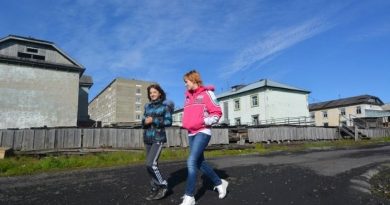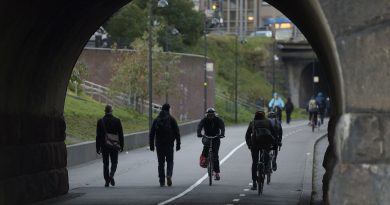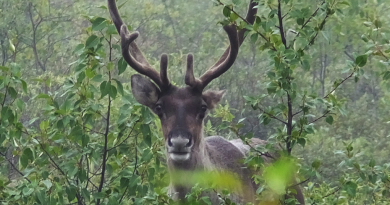Isolated and expensive, the N.W.T.’s Sahtu riding feels squeeze of climate change

· CBC News
Some grocery prices could rise dramatically in coming months, says business owner in Norman Wells
While the southern N.W.T. was battered by wildfires this summer, the territory’s remote Sahtu region faced its own climate challenge: a historically-low Mackenzie River.
For the first time in living memory, low water caused by extremely dry conditions prevented most of the season’s supply barges — hauling everything from drywall to gummy bears — from navigating the Mackenzie. The river is a lifeline for the five communities that make up the N.W.T.’s Sahtu riding: Deline, Fort Good Hope, Tulita, Colville Lake, and Norman Wells, the regional hub of roughly 800 people.
Joshua Earls is the president of the Norman Wells chamber of commerce and he runs a small empire in the community, making multiple trips a day along the metal walkway connecting his grocery store to Sahtú sPOT, his new cannabis shop next door. The 31-year-old also owns a trucking company and the community’s wood pellet business, keeping up to 30 employees on his payroll.
Despite his best efforts, Earls describes the region’s economy as “kind of dying.” Earls says nine barges would typically arrive in the region, but this year only two were able to reach their destination.
In his cramped office near the grocery store’s shelf of microwavable hamburgers, he shows a computer screen listing all the store’s products and their prices. He explains that in the next few months he will run out of the products he managed to barge up this summer and he will need to start flying up goods, which will increase the costs dramatically.
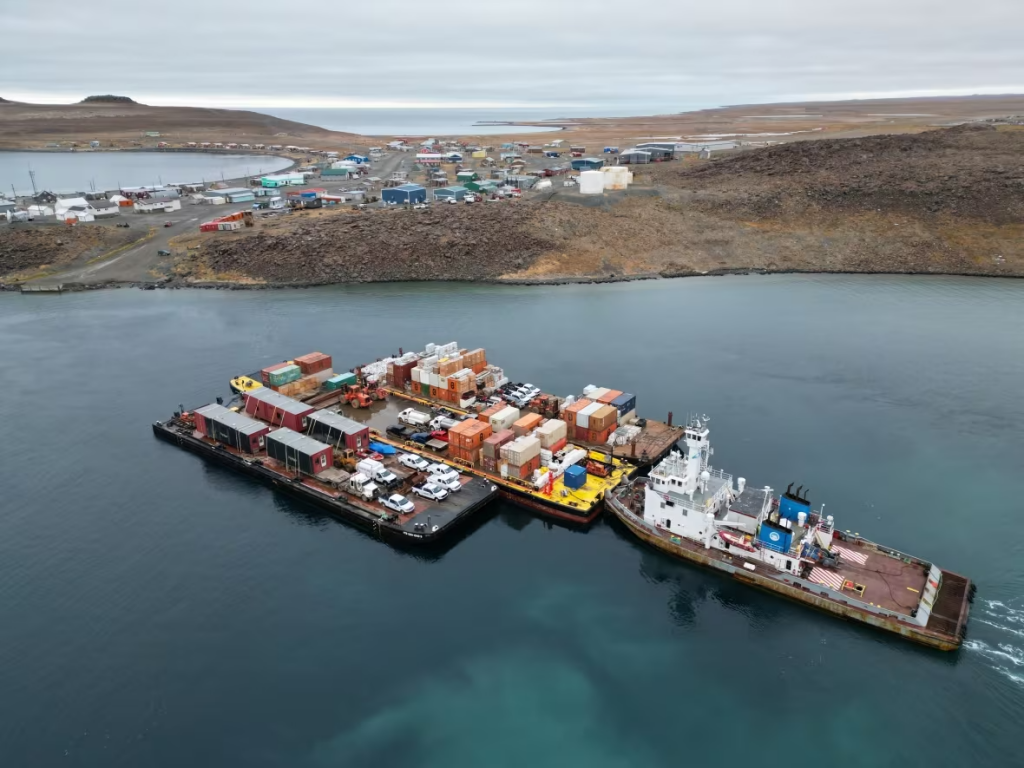
“Three-point-six litres of clean-water detergent would normally be $17.82 on our shelf and is now going to be $35.87. So it’s over double the price. I mean, you could see that all across the board, for whatever, ” he said, waving his hand at the screen.
He estimates customers can expect a 500 per cent increase in the shipping costs on all goods, until the region’s winter road is ready for traffic later this winter.
Other businesses are also feeling the effects of the difficult barging season. Drayton Walker grew up in Norman Wells, and now runs Ditchers Landscaping while also serving as vice-president of the town’s chamber of commerce, and running the local recycling centre. On the side, he volunteers as a firefighter and, after setting off the town’s Halloween fireworks display, he recounted how the barge season affected his summer.
“I specifically had been awarded a contract to build a fence for the Housing Corporation, and my materials were on the barge that got delayed. So it’s been a pretty big impact because I had, you know, $100,000 of fence materials that I did not get,” he said.
He also says he managed to get a truck of recycling on a barge heading south, but it wasn’t able to come back.
“So now I don’t have my semi here to bid on winter road transportation contracts. It will come up on the winter road, but I won’t have it here at the start of the year, so it won’t really work for me,” he said.
Walker also notes that part of the reason barges were disrupted this summer was that Hay River, where the vessels depart from, was evacuated for weeks because of wildfires. Wildfires also disrupted flight schedules to some communities after Yellowknife was evacuated. He said it got so bad at one point that medications were hard to come by, and the stores had no cigarettes for two weeks.
Walker and Earls both say the next government should prioritize building an all-season road to connect Norman Wells to the territory’s existing road system. The proposed 281-kilometre road has been in the works for years, but still faces many barriers including an environmental assessment — putting the most optimistic date for opening sometime in 2037.

Norman Wells resident Russell Manuel says he supports the idea of building an all-season road, and anything else that would help bring down the cost of living in the region.
“I have four growing boys in my house, so groceries are a big cost because boys eat a lot and you have to keep up with them,” he said while putting the finishing touches on his garage, which he had transformed into a haunted house for Halloween. “I would say, give or take, you spend about $300 every time you go to the store.”
Manuel, who is originally from a smaller community downriver in the Sahtu riding, Fort Good Hope, says he’s in a relatively good financial position, as he’s worked for Imperial Oil for more than twenty years. He feels badly for those who are less fortunate.
‘It’s so heartbreaking’
Kayla Turner, Norman Wells’s governance and community engagement manager, says even people with jobs have been having a tough time making ends meet.
In response, some town staff got together and started a food bank. Since opening during the pandemic, it’s grown to try to meet demand but recently had to scale back operations. The roughly thirty families who use the facility can now access food once a month, instead of once every two weeks.
“It’s so heartbreaking to have to say…we don’t have the funding and we don’t have any food,” Turner said.
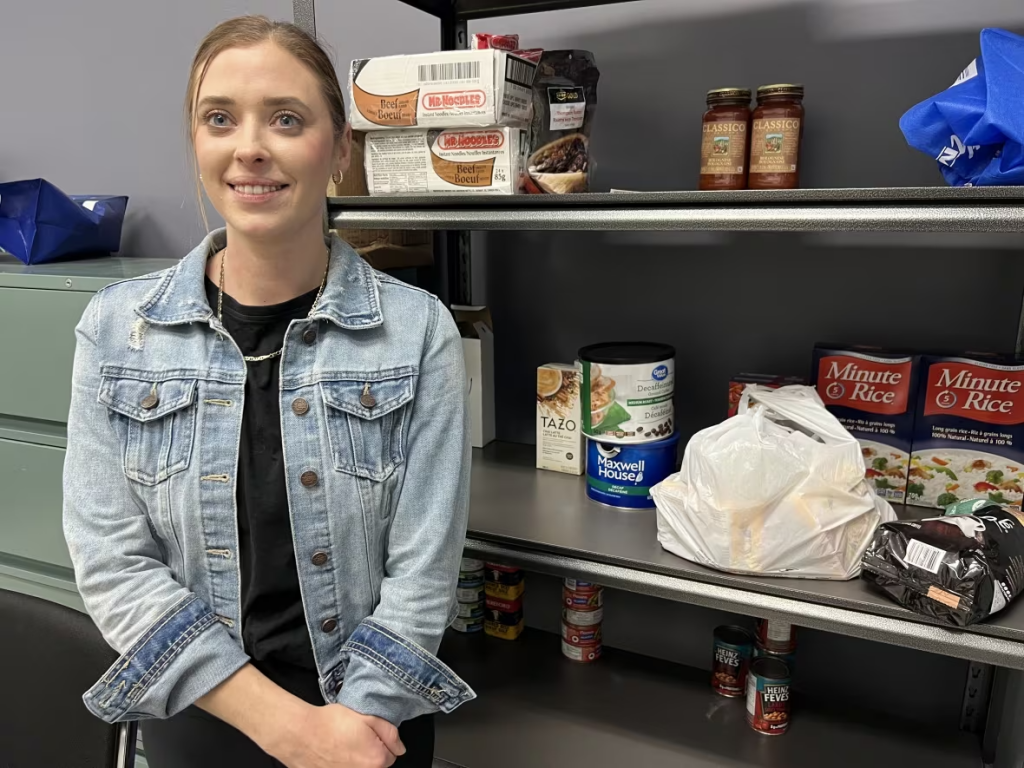
“At times, we’ve had employees take families to the store and use money from their own pockets. Like, I’m telling you, this community would do that for people, and we’ve seen it before.”
Frank Pope, the town’s mayor, says he’s proud of what the volunteers have been able to accomplish with the food bank, but says the rising cost of living goes beyond food.
“Last year I paid $8,100 for my winter fuel supply. That kicks the shit out of your budget. Kicks the hell out of your pension,” he said.
Pope says the solution to that, and the other cost-of-living issues, is to build the all-season road connecting Norman Wells to Wrigley and the rest of the territory’s road system. He says the current timeline of having that road built by 2037 at the earliest is “laughable.”

He also acknowledges that getting a better deal for the region will be a challenge for the Sahtu’s next MLA. Three people are running in the Nov. 14 election: Daniel McNeely, Delphine Pierrot and incumbent Paulie Chinna.
“It’s going to be a lot of work. I don’t envy them,” he said.
Related stories from around the North:
Canada: Arctic Permafrost Atlas offers insights into the North’s changing landscape, CBC News
Finland: Conservationists find more critically endangered Arctic fox cubs in Finnish Lapland, Yle News
Greenland: Canada and Greenland sign letter of intent on marine conservation area in Arctic, Eye on the Arctic
Norway: Climate change hits back at Svalbard, coal mine flooded by melting glacier in Norway, The Independent Barents Observer
Russia: Oral histories unlock impact of climate change on nomadic life in Arctic Russia, says study, Eye on the Arctic
Sweden: Extra billions to SAS – but with stricter climate requirements, Radio Sweden
United States: 30–50% of critical northern infrastructure could be at high risk by 2050 due to warming, says study, Eye on the Arctic

